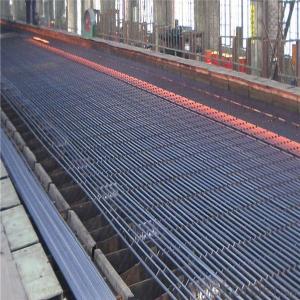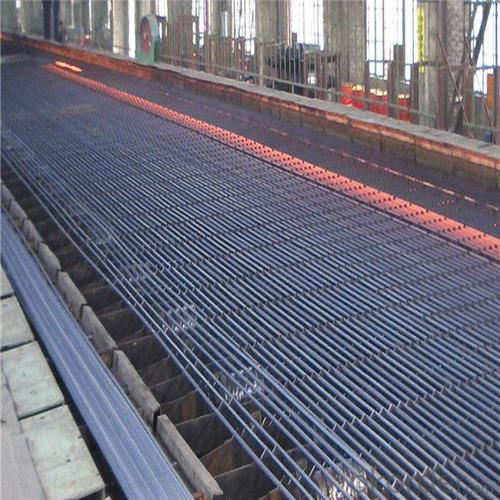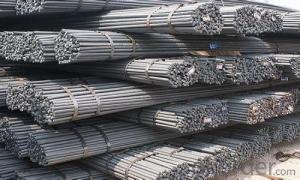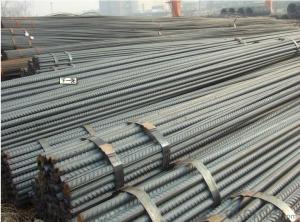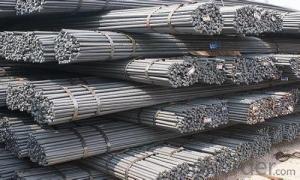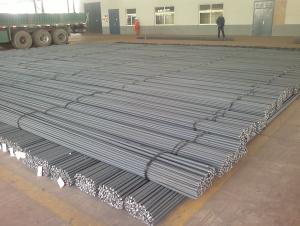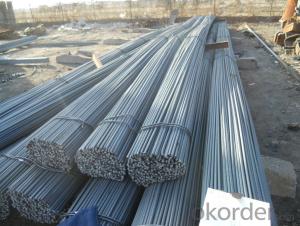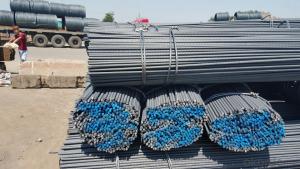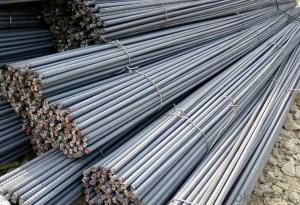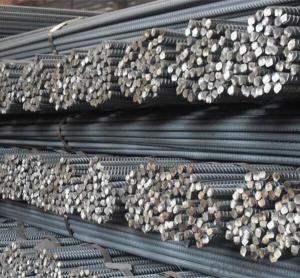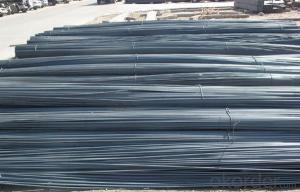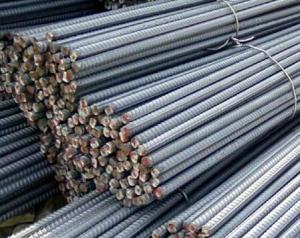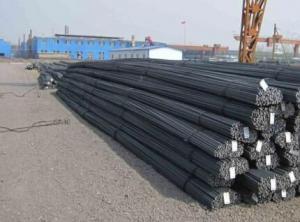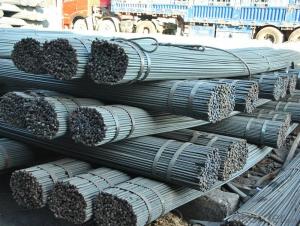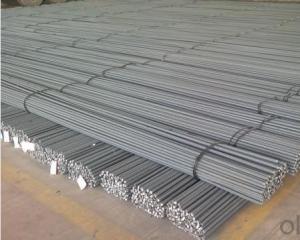High Tensile Deformed Steel Rebar Factory Price
- Loading Port:
- Qingdao
- Payment Terms:
- TT OR LC
- Min Order Qty:
- 100 m.t.
- Supply Capability:
- 18000 m.t./month
OKorder Service Pledge
OKorder Financial Service
You Might Also Like
Specification
Most grades of steel used in rebar cannot accept welding; such as, to adjacent steel plates or as means to bind
single pieces of rebar together. However, special grades of rebar steel and welding rods make welding by expert
welders possible.
To prevent workers from accidentally impaling themselves, the protruding ends of steel rebar are often bent over or
covered with special plastic "mushroom" caps.
Our Advantage: High quality steel products from 1 class mills in China
Reasonable price
Professionalism of the products
On-time delivery
Complete documents and certificates
Sincere service to meet our clients' requirements
Product Description :
Chemical composition (%): | Steel | C | Si | Mn | P | S | Ceq | ||||
HRB335 |
0.25 |
0.80 |
1.60 |
0.045 |
0.045 | 0.52 | |||||
HRB400 | 0.54 | ||||||||||
HRB500 | 0.55 | ||||||||||
Mechanical properties | Steel | Rel/ MPa | Rm/ MPa | A/ % | Agt/ % | ||||||
≥ | |||||||||||
HRB335 | 335 | 455 | 17 |
7.5 | |||||||
HRB400 | 400 | 540 | 16 | ||||||||
HRB500 | 500 | 630 | 15 | ||||||||
Package: | Standard export packing or as customer's request | ||||||||||
Application: | Construction, building, bridge, road. ect | ||||||||||
Payment terms | 1).100% irrevocable L/C at sight. | ||||||||||
Delivery time | 15-30 days after receipt of L/C or deposit by T/T | ||||||||||
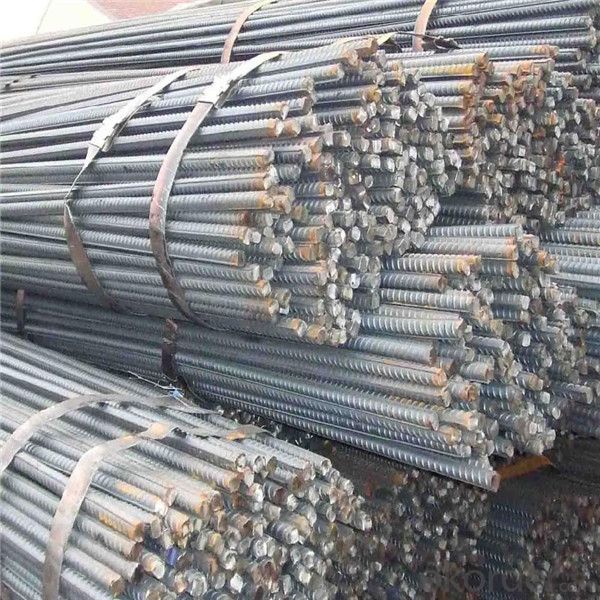
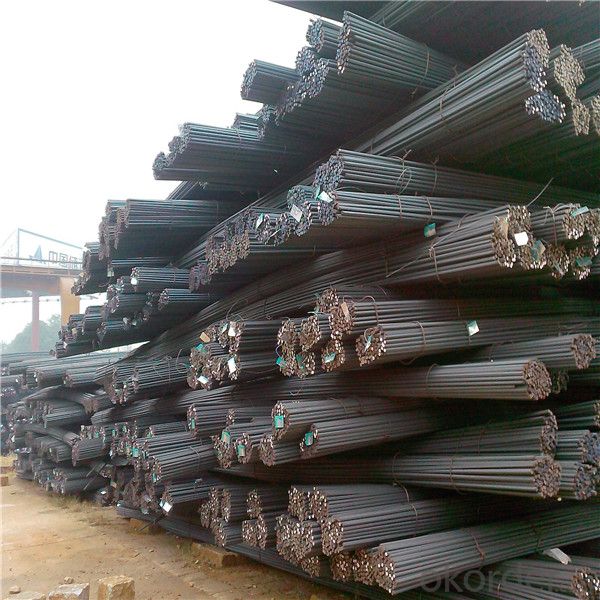
Packing:
In bundles, each bundle weight 3.5 tons. Load by container or by bulk verssel.
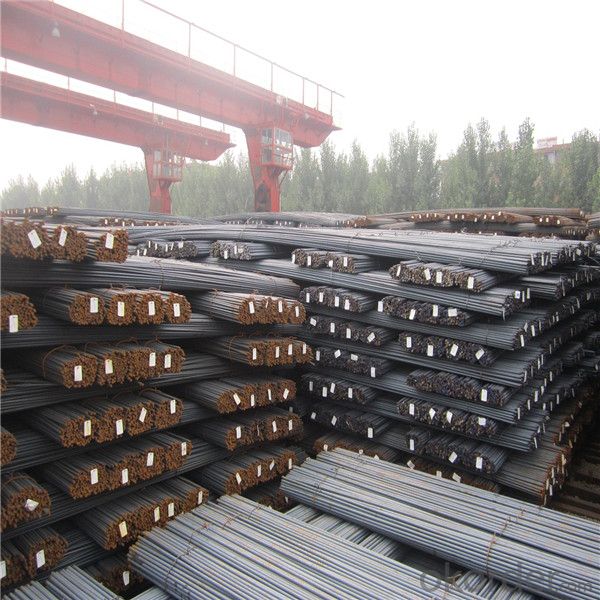
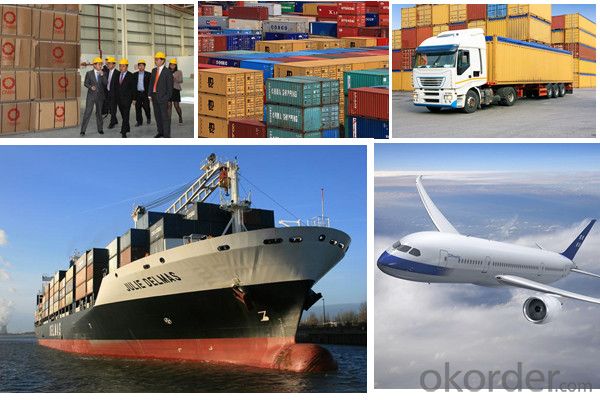
Our service
(1) We cooperate with famous factories with advanced equipment and well trained workers.
(2) We can provide factory price with trading company service.
(3) We continuously work on the improvement of our processes, guaranteeing consistently high standards
of quality to keep none compensation.
(4) We guarantee 24 hours response and 48 hours solution providing service.
(5) We accept small order quantity before formal cooperation.
(6) We deliver the agreed quality at the agreed time, reacting to changes in customer wishes in a flexible way.
(7) Due to our volume and selling power, we have excellent freight rates with shipping lines.
(8) We strive to always be fair and honest in our dealings with customers.
(9) We strive to work together with customers to achieve much more than we can achieve alone.
(10) Through our passion and commitment we aim to be a market leader in all our key markets. To maintain
our position as market leader we must continue to add value in all that we do.
FAQ:
1.Q: What's your MOQ(minimum order quantity)?
A: One full container, mixed acceptable .
2. Q: What's your packing methods?
A: Packed in bundle or bulk ..
3. Q: How can I buy CNBM products in my country?
A:Please send us an inquiry or email ,we will reply to you if there is distributor in your country
4. Q: Can we visit your factory?
A: Warmly welcome. Once we have your schedule, we will arrange the professional sales team to follow up your case.
5. Q: How long does it take to get the product if i place an order?
A:With the process of your requirements,we will pack and deliver in 3-7 days. If it is by sea shipment,it will take 15-45 days depending on different locations
- Q: What are the benefits of using stainless steel rebars?
- Using stainless steel rebars in construction projects offers several advantages. Firstly, they provide excellent resistance to corrosion, which is particularly crucial in environments with high humidity, coastal areas, or projects where the concrete will be exposed to water or chemicals. Unlike traditional carbon steel rebars, stainless steel rebars do not easily rust or corrode, ensuring the structure's long-term integrity and durability. Secondly, stainless steel rebars possess a higher tensile strength compared to carbon steel rebars. This means they can withstand greater forces and stresses without deforming or breaking. This makes them ideal for structures requiring a high load-bearing capacity, such as bridges, parking garages, and high-rise buildings. Moreover, stainless steel rebars have a low thermal expansion coefficient, meaning they do not significantly expand or contract with temperature changes. This property helps minimize cracking and structural damage caused by thermal stresses, ensuring the longevity and stability of the concrete structure. In addition to their mechanical properties, stainless steel rebars also offer aesthetic benefits. With their sleek and shiny appearance, they can enhance the visual appeal of architectural elements like exposed concrete walls or features in bridges and buildings. Lastly, stainless steel rebars are environmentally friendly as they are 100% recyclable, making them a sustainable choice for construction projects. By utilizing stainless steel rebars, builders and engineers can contribute to reducing the carbon footprint and promoting a greener construction industry. Overall, the advantages of using stainless steel rebars include superior corrosion resistance, high tensile strength, low thermal expansion, aesthetic appeal, and environmental sustainability. These benefits make stainless steel rebars the preferred choice for various construction applications, providing long-lasting and reliable reinforcement for concrete structures.
- Q: Can steel rebars be used in reinforced masonry walls?
- Yes, steel rebars can be used in reinforced masonry walls. The rebars are typically embedded within the masonry structure to provide additional strength and stability.
- Q: Are there any disadvantages to using steel rebars?
- Yes, there are some disadvantages to using steel rebars. Firstly, steel rebars can corrode over time, especially in environments with high moisture or exposure to chemicals, which can reduce their strength and durability. Additionally, steel rebars are susceptible to thermal expansion and contraction, leading to cracking in concrete structures. Moreover, steel rebars are heavy and can be challenging to handle and transport, making construction processes more labor-intensive.
- Q: What is the thermal expansion coefficient of steel rebars?
- The thermal expansion coefficient of steel rebars typically ranges between 10 and 12 x 10^-6 per degree Celsius.
- Q: What is the process of connecting steel rebars to structural members?
- To establish a secure and dependable connection, several steps are involved in connecting steel rebars to structural members. To begin with, the structural member's design specifications necessitate the precise positioning of the long, ridged or deformed steel bars called rebars. This is typically accomplished by using spacers or chairs to maintain the appropriate spacing between the rebars and the surrounding formwork. Following that, the rebars are connected to the structural member through various means. A common method is lap splicing, where the rebars overlap for a designated distance and are then tied together using wire or mechanical connectors. The length of the overlap is determined by engineering calculations to ensure adequate strength and load transfer. Another approach involves the use of pre-fabricated mechanical couplers, which provide a dependable connection between the rebars. These couplers are designed to securely grip the rebars and effectively transfer the load. They offer advantages such as quicker installation, reduced labor costs, and enhanced structural integrity. In addition to splicing, the rebars may also need to be anchored or hooked into the structural member. Anchoring involves extending the rebar's length beyond the connection point and bending it back into the concrete to create a hook shape. This provides additional resistance against pull-out forces. Throughout the process, it is crucial to ensure that the rebars are clean, free from rust, and properly aligned. Any contaminants or misalignments can weaken the connection and compromise the structural integrity. Therefore, comprehensive inspection and quality control measures are essential to ensure a successful connection. Overall, the process of connecting steel rebars to structural members requires meticulous planning, precise positioning, proper splicing or coupling, and thorough inspection. By following these steps, a robust and long-lasting connection can be achieved, guaranteeing the safety and stability of the structure.
- Q: Can steel rebars be used in the construction of religious buildings?
- Yes, steel rebars can certainly be used in the construction of religious buildings. Steel rebars are commonly used in construction projects to reinforce concrete structures, and religious buildings are no exception. The use of steel rebars helps enhance the structural integrity of the building, ensuring its durability and safety.
- Q: How are steel rebars used in the construction of oil and gas refineries?
- The strength and durability of steel rebars make them widely used in the construction of oil and gas refineries. These rebars, made from high-strength steel, reinforce concrete structures and increase their load-bearing capacity. In the construction of oil and gas refineries, steel rebars are primarily utilized in various reinforced concrete structures like foundations, columns, beams, slabs, and walls. These structures are crucial for supporting heavy equipment, storage tanks, processing units, and other essential refinery components. During construction, rebars are embedded in the concrete, forming a reinforced framework that can withstand high loads, seismic activity, and extreme weather conditions. The steel reinforcement enhances the concrete's tensile strength, making it more resistant to cracks and structural failure. Furthermore, the use of rebars ensures the long-lasting nature of refinery infrastructure. Oil and gas refineries operate in harsh environments with exposure to chemicals, high temperatures, and corrosive agents. Steel rebars possess excellent corrosion resistance, which is vital for maintaining the structural integrity of the refinery. Moreover, rebars facilitate the construction of complex shapes and configurations required in refinery structures. They can be bent, cut, and molded to fit specific design requirements, enabling the creation of intricate concrete structures essential for the refinery's functionality. Overall, steel rebars play a vital role in oil and gas refinery construction, providing necessary reinforcement to concrete structures. Their strength, durability, and corrosion resistance make them ideal for enduring the demanding conditions in these facilities, ensuring the safety and longevity of the refinery infrastructure.
- Q: What is the role of steel rebars in preventing concrete cracking?
- Steel rebars play a crucial role in preventing concrete cracking by providing reinforcement and enhancing the overall strength and durability of concrete structures. When concrete undergoes tensile stress, it tends to crack due to its low tensile strength. However, steel rebars, which are typically embedded within the concrete, act as a reinforcement by absorbing and distributing these tensile forces throughout the structure. The presence of steel rebars in concrete helps to counteract the natural tendency of concrete to crack under tension. When a load is applied to the concrete, the rebars bear a significant portion of the tensile stress, preventing it from being solely concentrated on the concrete matrix. This distribution of forces helps to minimize the formation and propagation of cracks, ensuring the structural integrity of the concrete. Moreover, steel rebars also contribute to the overall strength and durability of concrete structures. The combination of steel's high tensile strength and concrete's compressive strength results in reinforced concrete, which exhibits superior resistance to various external forces such as bending, shear, and seismic loads. This added strength makes the concrete less susceptible to cracking and enhances its ability to withstand heavy loads and environmental factors over time. In summary, steel rebars play a crucial role in preventing concrete cracking by providing reinforcement, absorbing and distributing tensile forces, and enhancing the overall strength and durability of concrete structures. Their presence significantly improves the structural integrity and longevity of concrete, making it a reliable and widely used construction material.
- Q: What are the different uses of wire rod and thread steel?
- Thread steel is widely used in housing, bridges, roads and other civil engineering construction. From the highway, railway, bridges, culverts, tunnels, dams, flood control and other public facilities, small building foundation, beams, columns and walls, plates, rebar structure is indispensable material.
- Q: How do steel rebars contribute to the structural soundness of a building?
- The construction industry heavily relies on steel rebars to ensure the structural integrity of buildings. These reinforcing bars, commonly referred to as rebars, are composed of steel and embedded within concrete to provide additional strength and reinforcement. One of the main ways in which steel rebars contribute to a building's structural soundness is by bolstering its tensile strength. Concrete is excellent at handling compressive forces but lacks strength when it comes to tension. Buildings are subjected to various loads, including wind, earthquakes, and their own weight, which exert both compressive and tensile forces. By incorporating steel rebars into the concrete, the overall structure's tensile strength is significantly improved. This prevents the concrete from cracking or failing under tension, guaranteeing the stability and durability of the building over time. Additionally, steel rebars enhance a building's ductility, which refers to its ability to deform under stress without breaking. Concrete, being a brittle material, lacks ductility and tends to fail suddenly when subjected to excessive stress. With the inclusion of steel rebars, the concrete-reinforced structure gains the capacity to absorb and distribute energy, allowing it to undergo controlled deformations without abrupt failure. This increased ductility ensures that the building can withstand dynamic loads, such as those generated during an earthquake, and reduces the risk of catastrophic collapse. In addition to improving tensile strength and ductility, steel rebars also contribute to the overall stability and load-bearing capacity of a building. By evenly distributing the load across the structure, they help minimize the concentration of stress in specific areas, thus preventing potential weak points or failure spots. This distributed load-bearing capacity ensures that the building can support its intended weight and endure the forces acting upon it. Furthermore, steel rebars play a crucial role in extending the lifespan of a building by offering protection against corrosion. Steel is prone to rust when exposed to moisture and air, which can compromise its structural integrity. However, rebars are often coated with epoxy or other anti-corrosion materials to prevent rusting. This protective layer ensures that the steel remains intact and maintains its strength over time, further bolstering the structural soundness of the building. To summarize, steel rebars are essential components in guaranteeing the structural soundness of buildings. They enhance concrete's tensile strength, improve its ductility, increase load-bearing capacity, and safeguard against corrosion. By incorporating steel rebars, buildings can withstand various loads, resist cracking, and ensure long-term stability and durability.
Send your message to us
High Tensile Deformed Steel Rebar Factory Price
- Loading Port:
- Qingdao
- Payment Terms:
- TT OR LC
- Min Order Qty:
- 100 m.t.
- Supply Capability:
- 18000 m.t./month
OKorder Service Pledge
OKorder Financial Service
Similar products
Hot products
Hot Searches
Related keywords
